2 Week Letter of Resignation Template for a Smooth Transition
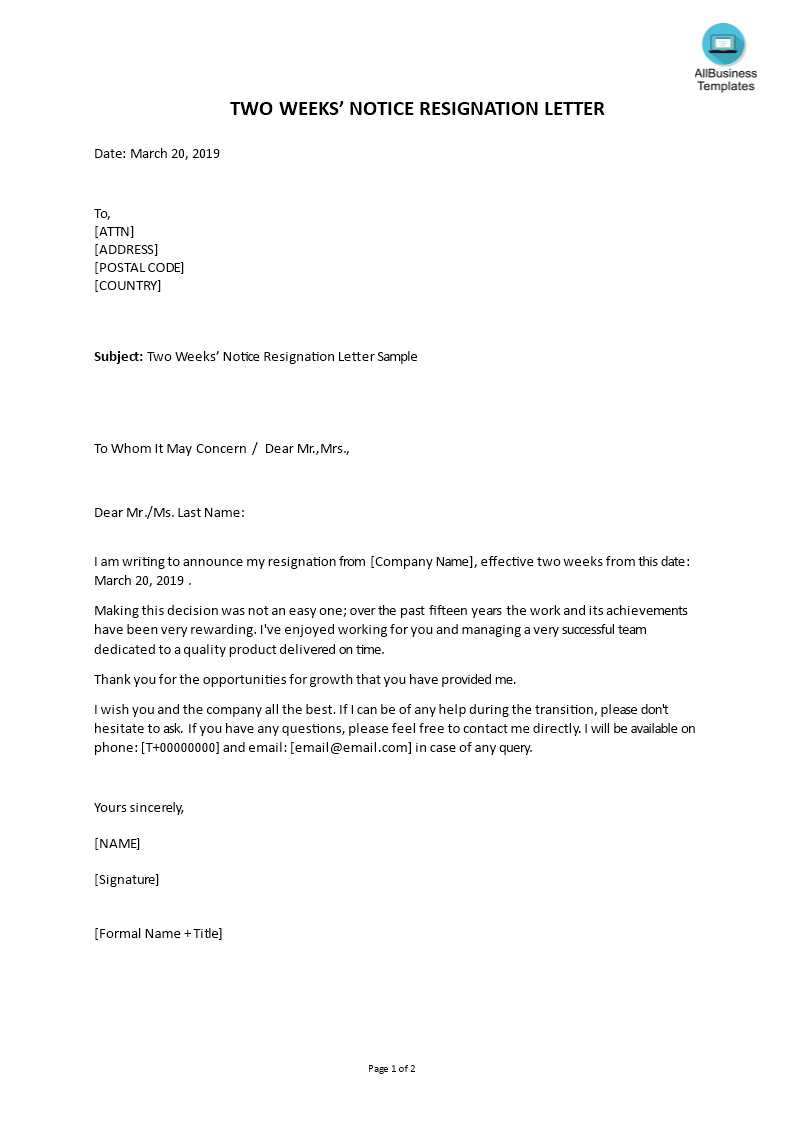
When it’s time to move on from a job, leaving on good terms is essential for maintaining your professional reputation. One of the most effective ways to do this is by providing formal notice ahead of your departure. This allows your employer time to make necessary adjustments and helps ensure a smooth transition for both parties.
In this guide, we’ll explore the key aspects of crafting a clear and respectful announcement of your intent to leave. Whether you’re preparing to hand over your responsibilities or simply want to maintain positive relationships, understanding how to communicate your decision properly can have a lasting impact on your career.
Clear communication is crucial when informing your employer of your departure, as it demonstrates respect for the company and its operations. Properly preparing your message will ensure that the process remains smooth, leaving no room for misunderstandings.
Why a Two Week Notice is Important
Providing advanced notice before leaving a position is a professional courtesy that benefits both the employee and the employer. It allows time for the organization to adjust and make arrangements, such as finding a replacement or redistributing tasks. This period ensures that your departure doesn’t disrupt the workflow or leave your team in a difficult position.
Respect plays a key role in this practice. Giving notice shows consideration for your employer’s time and the efforts required to handle your exit. It also gives you the opportunity to wrap up ongoing projects, leaving a positive impression and a legacy of responsibility.
Beyond the immediate work environment, maintaining this level of professionalism can support your career in the long run. Employers and colleagues alike will appreciate the transparency, which can lead to strong references and future opportunities.
How to Structure Your Resignation Letter
When informing your employer about your decision to leave, it’s important to do so in a clear, concise, and respectful manner. Structuring your message properly not only helps convey your intentions but also ensures that all necessary details are included for a smooth transition. A well-organized communication can prevent misunderstandings and demonstrate professionalism.
Key Elements to Include
Your message should consist of several key sections, each addressing different aspects of your departure. Here’s an overview of the components you should include:
| Section | Description |
|---|---|
| Introduction | Begin by stating your intent to leave and provide the necessary timeline. Be clear and direct. |
| Gratitude | Express appreciation for the opportunities and experiences you’ve gained during your time at the company. |
| Transition Assistance | Offer assistance in transitioning your duties or training your replacement to ensure a smooth handover. |
| Conclusion | Conclude with a positive note, maintaining goodwill and leaving the door open for future collaboration. |
Maintain a Professional Tone
Throughout your message, ensure that the tone remains respectful and professional. Even if your experience wasn’t entirely positive, keeping a courteous approach can go a long way in preserving your reputation. Avoid negative comments or critiques, as this could tarnish your professional image.
Key Phrases for a Professional Resignation
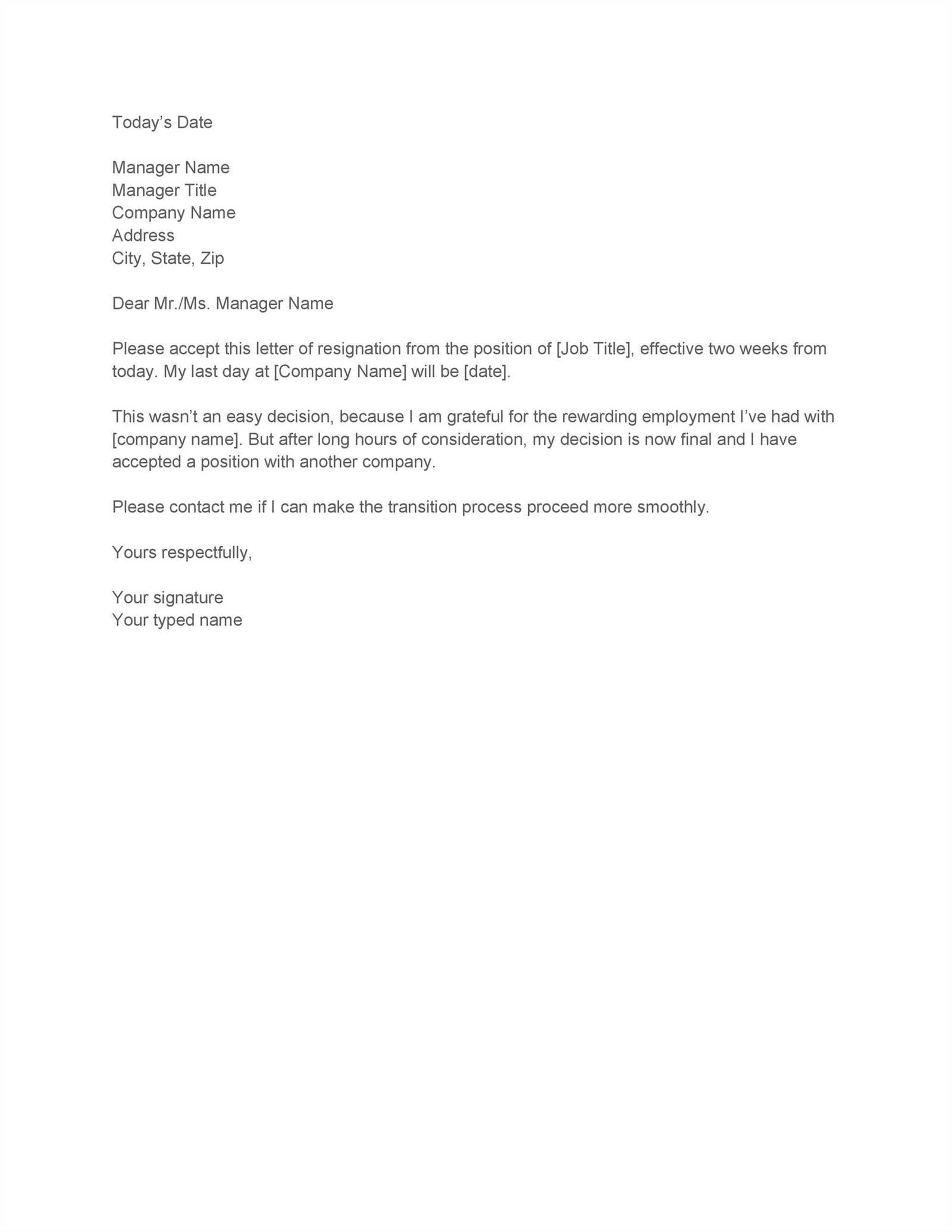
Choosing the right words when announcing your decision to leave is crucial for maintaining a positive and professional relationship with your employer. Clear and respectful language ensures that your message is received in the best possible light, while also reflecting your appreciation for the opportunities provided.
Common Phrases to Include
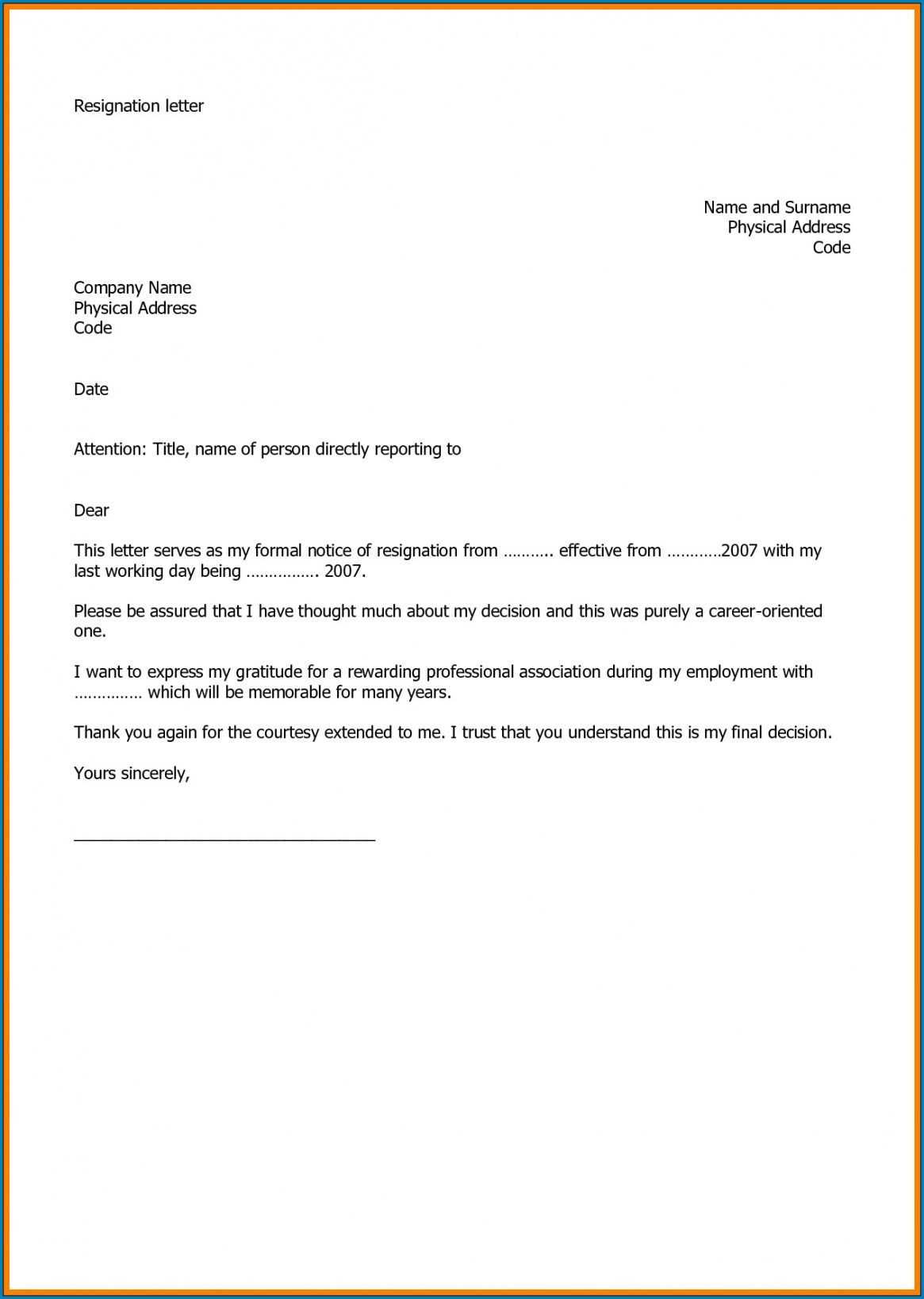
Here are several phrases to consider when crafting your departure message:
- “I would like to formally inform you of my decision to leave my position.”
- “I appreciate the opportunities I have had while working with the company.”
- “Please let me know how I can assist in the transition process.”
- “I look forward to staying in touch and wish the team continued success.”
- “It has been a pleasure working with you and the team.”
How to Express Gratitude and Offer Help
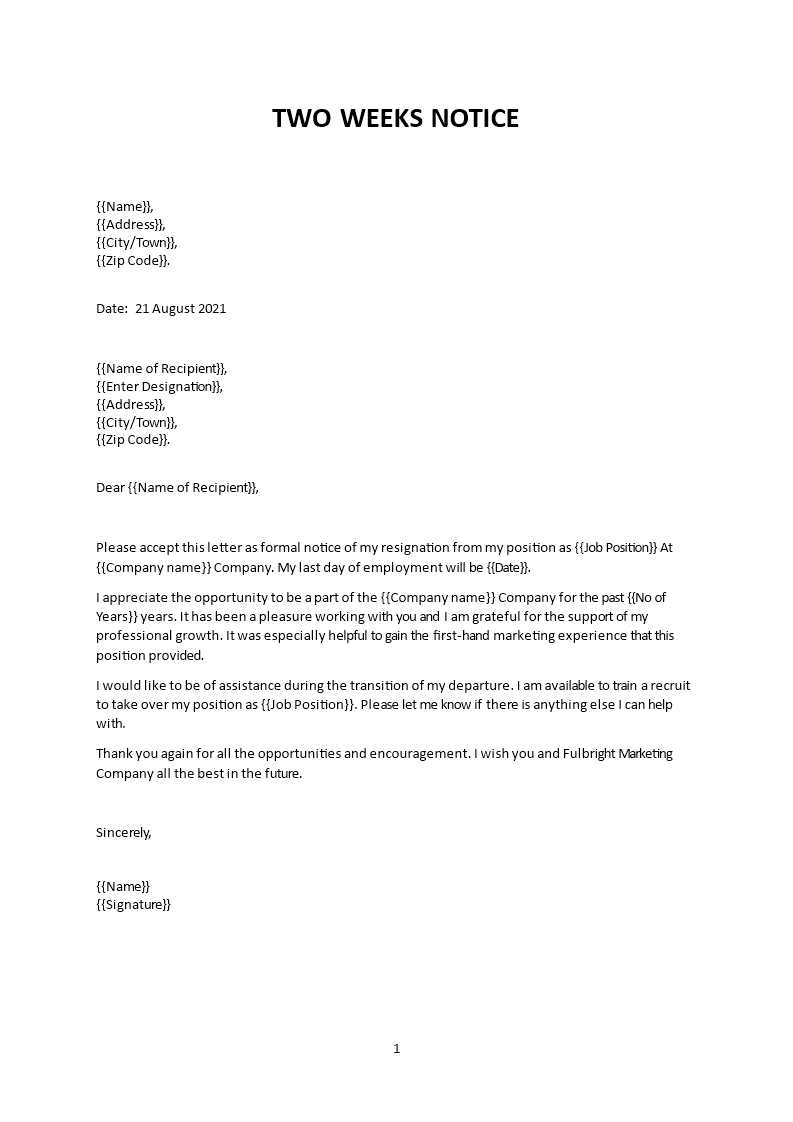
When you express gratitude, it’s important to be specific about what you appreciated. This strengthens your message and leaves a lasting positive impression:
- “I am thankful for the growth and development opportunities offered during my time here.”
- “I value the experience I gained and the relationships I built with my colleagues.”
- “I am happy to assist in training my replacement or ensuring a smooth handover.”
Common Mistakes to Avoid in Resignation Letters
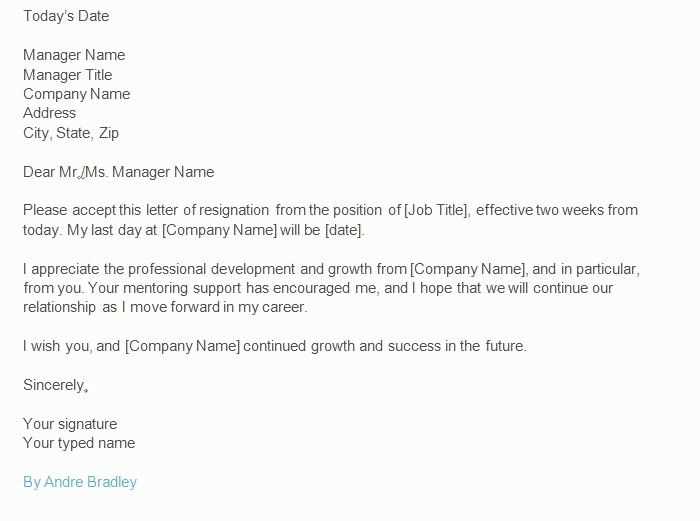
When announcing your decision to leave, it’s important to avoid certain missteps that could harm your professional image or create unnecessary tension. A poorly worded or thoughtless message can lead to misunderstandings and leave a negative impression. Recognizing and steering clear of these common mistakes ensures your departure is handled smoothly and respectfully.
One key error is failing to provide adequate notice. Leaving without giving sufficient time for the company to adjust can be seen as inconsiderate. It’s important to follow standard protocols and give enough time for your employer to make the necessary arrangements.
Another mistake is focusing too much on negative aspects of your experience. While it’s understandable to feel frustrated, it’s important to remain diplomatic. Criticizing your employer or colleagues in your departure communication can reflect poorly on you and could damage relationships that may be valuable in the future.
Lastly, neglecting to offer assistance with the transition is a missed opportunity to demonstrate professionalism. By showing willingness to help, such as training a replacement or ensuring a smooth handover of tasks, you leave a lasting positive impression and show respect for the team and the company’s operations.
When to Submit Your Two Week Notice
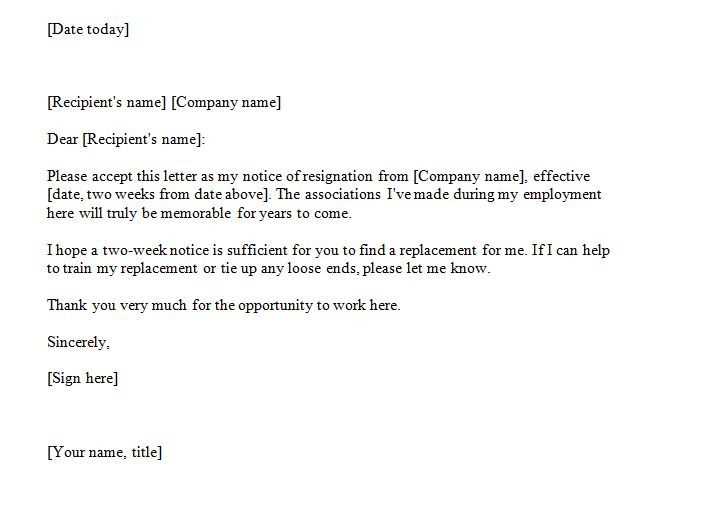
Timing your formal notice of departure is crucial to ensuring that both you and your employer are well-prepared for the transition. Submitting it at the right moment helps avoid unnecessary complications and allows for proper planning. Knowing when to provide this notification can influence how smoothly your exit unfolds.
Ideally, you should submit your notification as soon as you have made a final decision about leaving. This gives your employer enough time to make arrangements, such as finding a replacement or redistributing responsibilities. In most cases, two weeks’ notice is considered the standard, but you may need to adjust this depending on company policies or your specific role.
It’s also important to consider any significant events, deadlines, or projects you may be involved in before submitting your notice. If your departure could affect major company activities, you may want to give more time or coordinate the timing to ensure everything is properly handled.
How to Handle a Counteroffer After Resigning
After informing your employer of your decision to leave, you may find that they extend an offer to entice you to stay. While this is a flattering response, it’s important to approach the situation thoughtfully. A counteroffer can present both opportunities and challenges, and it’s essential to carefully weigh your options before making a decision.
First, consider your reasons for leaving in the first place. Was it about seeking a new challenge, work-life balance, or better growth opportunities? If these core reasons haven’t been addressed in the counteroffer, accepting it may only delay the inevitable and cause more frustration down the road. Reflecting on your long-term goals will help you make a decision that aligns with your personal and professional aspirations.
If the counteroffer seems appealing, take the time to evaluate it thoroughly. Look beyond salary increases to assess other factors, such as career advancement, company culture, and job responsibilities. Sometimes, an offer may sound good in the short term but might not align with your career trajectory in the long run.
Finally, if you decide to decline the counteroffer, do so with respect and professionalism. Express your gratitude for the offer and reaffirm your decision, ensuring that you leave the company on positive terms.